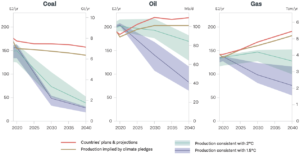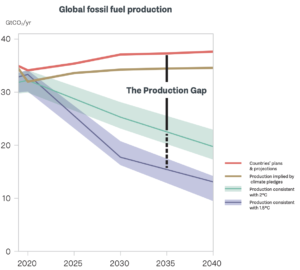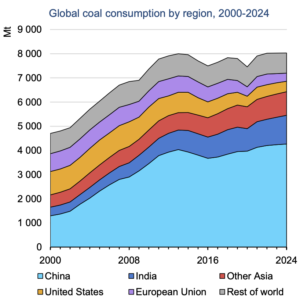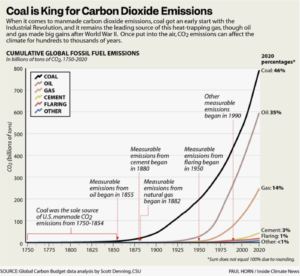Sunday environmental round up.
January 30, 2022
To limit global warming we must stop producing and burning fossil fuels. But nations’ and companies’ plans don’t match their grand pledges and rhetoric. Nor with deforestation.
Coking coal’s fire is dying
The Australian coal industry and its investors and hangers-on regularly trot out four standard arguments (not necessarily evidence-based) to justify its ongoing existence:
- Australian thermal coal is the cleanest, highest quality coal in the world;
- We are simply supplying an eager market;
- If we don’t supply the market for coal, someone else will (the drug pusher argument) and the outcomes will be worse for both the environment and people’s health than burning good Aussie coal;
- Australia produces the best coking (metallurgical) coal in the world. The world needs steel and there’s currently no viable alternative for steel production.
The Institute for Energy Economics and Financial Analysis (IEEFA) has identified five reasons why the industry might want to reconsider the coking coal argument:
- China produces nearly 60 per cent of the world’s steel and Australia supplies much of the coking coal needed for its blast furnaces. But (a) it’s quite possible China’s steel production has peaked and (b) it’s likely that more of China’s steel needs will be met with scrap steel which can be recycled using electric arc furnaces. This will reduce China’s need for Australian coking coal and iron ore, increase their energy security and create a sense of schadenfreude in Beijing.
- Blast furnaces will be progressively replaced with Direct Iron Reduction (DRI) technology using green hydrogen. This will reduce China’s need for Australian coal even further.
- These changes will remove the excuse our banks hide behind for continuing to finance coking coal developments in Australia — “there’s no alternative for producing steel”. Coking coal miners will then experience the same funding difficulties that thermal coal miners currently experience.
- There is increasing international pressure to reduce methane emissions and both the mining and burning of coking coal are significant sources. Australia may have refused to join the global methane pledge at the Glasgow COP meeting but the USA and EU were enthusiastic initiators of the pledge to reduce methane emissions by 30% by 2030. Action on methane was also part of the US-China Joint Declaration on Climate Action in Glasgow.
- India’s demand for coking coal is likely to decrease for similar reasons, plus its intention to supply more of its own coking coal.
The glory days for Australia’s coking coal miners may be limited.
Lord, make me carbon-free but not just yet
When god designed the laws of physics s/he had a sense that while nation states would be able to manage what went on within their Earthly borders 13 billion years into the future, they might struggle to control what happened in the spaces between them. So, to save humanity a lot of trouble, s/he excluded inter-national activities from the laws of physics. Just in case you’ve ever wondered, that’s the reason that the greenhouse gases emitted by international shipping are excluded from the Paris Agreement. Thank god is all I can say because otherwise the more than 800 million tonnes of CO2 emitted by international shipping each year (about 3 per cent of the total actually counted under the Paris rules) might make it even more difficult to keep warming below 1.5 degrees Celsius. And that’s not even considering the Black Carbon and other greenhouse gases emitted by international shipping that would increase its global warming activities by a further third.
The UN International Maritime Organization (IMO) currently has a target of halving shipping’s emissions by at least 50 per cent by 2050. Sensing a change in the wind, which sailors are good at, the industry would like to be more ambitious but countries at the recent IMO meeting couldn’t agree on a reductions target (50 or 100 per cent??) or a date (2030, 2040 or 2050??) or who should pay for it. So, channelling the adolescent St Augustine, they kicked the can down the road and have given themselves two years simply to develop a strategy for further consideration. Just as well, then, that these emissions won’t affect global warming. Good thinking, god.
Governments’ climate action hypocrisy
The UK has made some impressive commitments on climate change:
- The Climate Change Act 2008 legally binds the government to carbon budgets, including being over three-quarters of the way to net zero by 2035;
- Its Nationally Determined Contributions (NDCs) for the Paris Agreement commit the UK to reduce its carbon emissions by at least 68 per cent by 2030 compared with 1990;
- In October 2021 it committed to reaching net zero by 2050.
So far so good. But is it doing enough to achieve these bold commitments? The government’s own forecasts show that the UK’s emissions in 2037 will be more than double what they are legally required to be and, like Australia, the UK is favouring future, unproven technologies rather than currently viable ones to make emissions reductions. Client Earth uses “the power of the law to bring about systemic change that protects the earth for – and with – its inhabitants”. It believes the UK government has breached its legal duties under the 2008 Act and, by placing an unfair burden on future generations, the European Convention on Human Rights. So it is taking the government to court to force them to tackle the policy gaps in their net zero strategy. Client Earth is looking to repeat the successes of similar lawsuits directed at the governments of Germany and The Netherlands.
There can be no surprise at all that the UK is just one of many countries whose actual emissions reduction plans don’t match their rhetorical promises and legal obligations; a point driven home by countries’ projections for the production of fossil fuels over the next 20 years. The three graphs below show countries’ plans and projections for the production of coal, oil and gas between 2020 and 2040. Two things stand out. First, for coal, oil and gas, countries’ plans and projections for production are significantly higher than the production amounts implied by their climate pledges. Second, and more importantly, although there’s a marginal reduction projected for coal, sizeable production increases are planned for oil and gas. For none of the three do countries’ production plans (or even their climate pledges) come close to what would be required to keep global warming under 2C, let alone 1.5C.

(The abbreviations on the vertical axes refer to:
EJ/yr Exajoules per year
Gt/yr Gigatons per year
Mb/d Million barrels per day
Tcm/yr Trillion cubic metres per year)
The next graph shows the effect that these production plans will have on CO2 emissions. This clearly demonstrates the massive gap between the CO2 that will be produced and the CO2 reduction pathways required to keep warming below 1.5C and 2C. The hypocrisy and/or stupidity and/or incompetence and/or corruption of our politicians is staggering.

Yes, yes, but maybe the fossil fuel producing countries are simply keeping their mines and wells going to boost the economy and create jobs. Maybe they aren’t expecting to sell all the stuff they dig up. Nice try but sorry, the graph below shows that global coal consumption between now and 2024 is predicted to be about the same as it was ten years ago – so, no sign yet of us burning less coal in the foreseeable future.

The International Energy Agency’s report contains some interesting titbits about coal:
- China is the world’s largest producer, importer and consumer of coal;
- China consumes over half of the global total; add India and it’s two-thirds;
- Over the last decade China has expanded its non-fossil fuel energy generating capacity more than any other country.
Are the coal producing and burning countries serious about quickly implementing their net zero emissions commitments? That’s the real question.
And just to remind you that coal is indeed the biggest single contributor to climate change:

Legal profiting from deforestation
Sumatra, a hotspot for palm oil development, is the only place where tigers, rhinos, orangutans and elephants live in the wild.

In recent years climate activists have focused their attention not only on the fossil fuel industry itself (the producers and burners of coal, oil and gas) but also their suppliers, financiers, investors, insurers, etc. Deforestation is a significant cause of both global warming and loss of biodiversity but much of the opprobrium and activism has been directed at lax and corrupt governments and illegal tree clearing rather than the companies and their financial backers that “legally” benefit from the deforestation. A recent report from the UK has examined the commitments of 350 companies and 150 financial institutions that use or finance “forest risk” commodities such as beef, soy, palm oil and timber. Approximately a third of the 350 companies have no policies to stop deforestation and nearly three-quarters have made only very weak commitments related to one or two of their less important products. Soy and beef are the biggest drivers of deforestation but only a quarter of food manufacturers, retailers and restaurant chains have pledged to eliminate deforestation from their supply chains.
During 2016-2020 financial institutions made US$1.74 billion dollars from forest-destroying deals, so no surprise that 93 of the 150 large investors such as BlackRock and public banks such as JP Morgan and Citigroup have no deforestation policies for investments or lending. According to the UN, over the last decade about forty times more finance flowed to destructive land-use practices than to forest protection and sustainable agriculture. Recommendations for financial institutions include:
- Provide remedy and redress for affected communities and ecosystems
- End secretive financing practices
- Undertake rigorous due diligence of companies operating in forest-risk areas
- Publish exclusion lists for financing companies and activities in no-go areas
- Cap and transition out of land-intensive industries
- Demonstrate zero tolerance for attacks on environmental defenders, illegal land grabs and violations of the rights of local communities.
These pictures and video are almost too twee to be true but I’m covering the piece in good faith. I’m tempted to say it’s charming even though it does expose my undesirable anthropocentrism!



